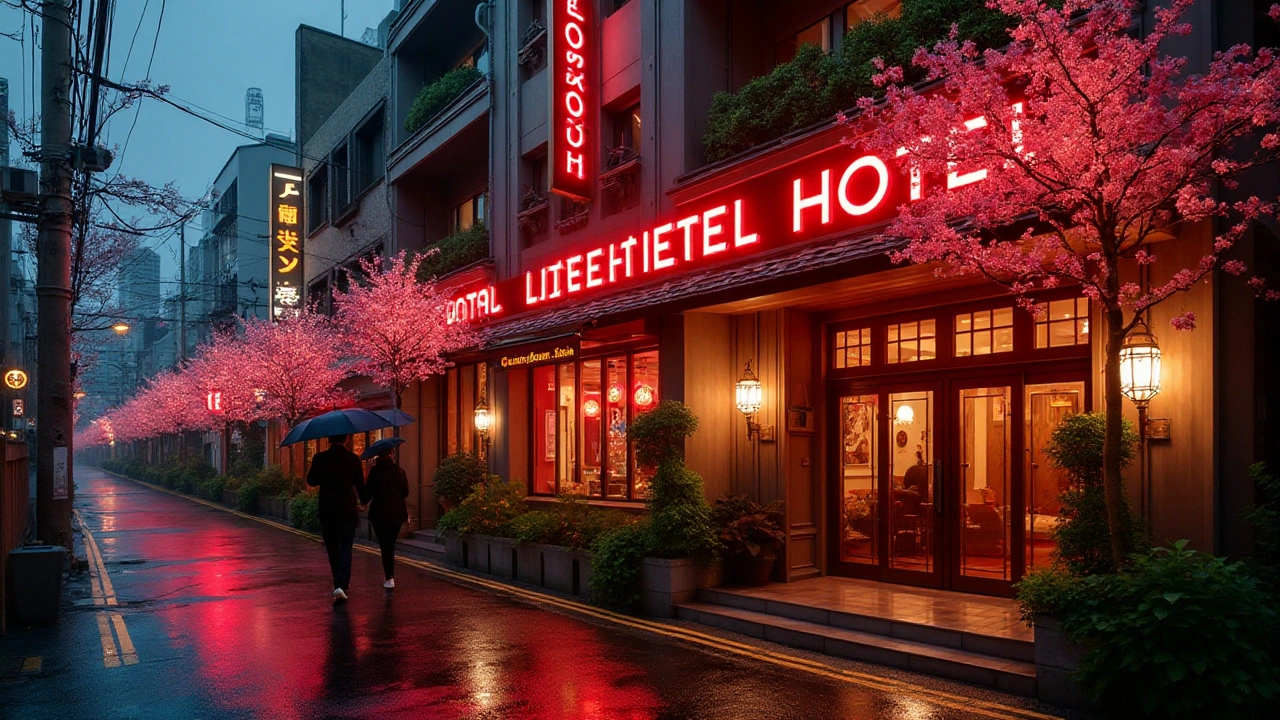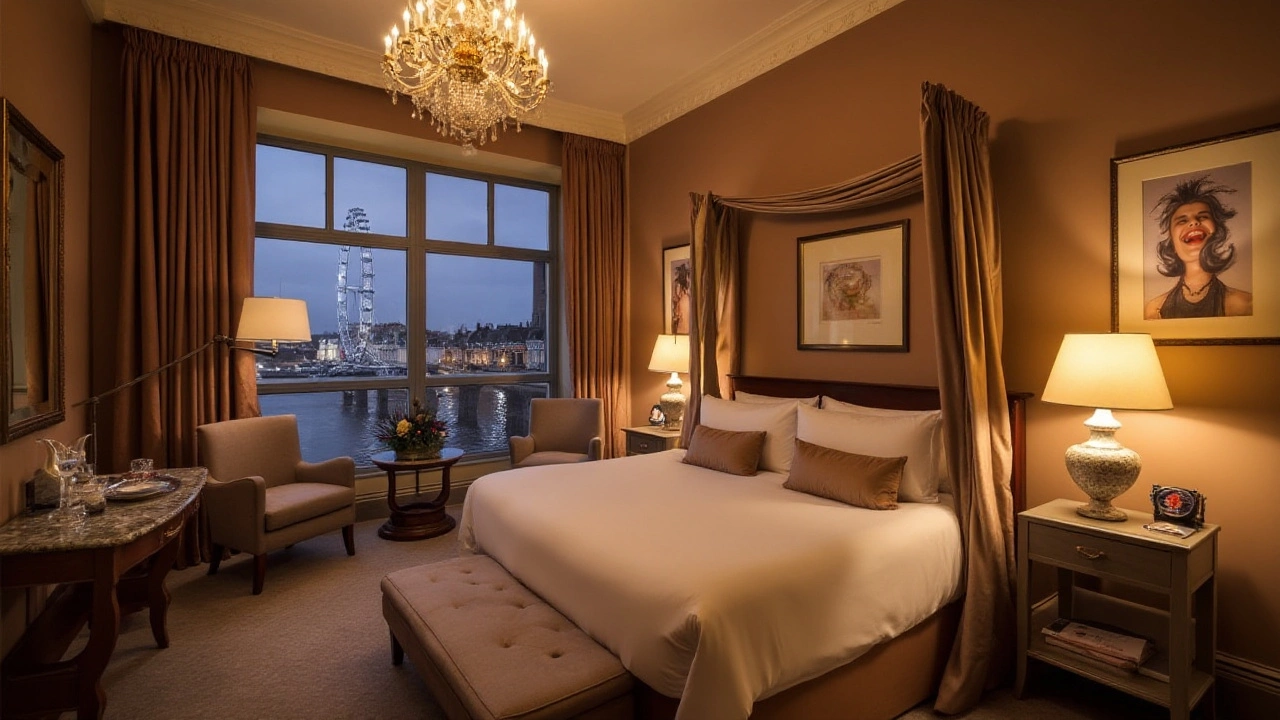When we think about unique experiences in travel, love hotels often spring to mind as intriguing aspects wrapped in both romance and mystery. Originating from Japan, these establishments are specially crafted havens designed to offer couples an escape from the ordinary world, each with its own theme ranging from enchanting to quirky.
Though initially rooted in Japanese culture, the concept of love hotels has quietly crossed international borders, capturing the imagination of travelers in other parts of the world. In this article, we'll delve into their origins, explore the fascinating array of features they offer, and consider their growing influence across the globe. This newfound popularity leaves one wondering what makes these places stand out for those in search of a special yet private romantic rendezvous.
- The Origin of Love Hotels
- Unique Features and Themes
- Global Influence and Expansion
- Tips for Choosing the Perfect Love Hotel
- The Cultural Impact of Love Hotels
The Origin of Love Hotels
The history of love hotels is as fascinating as the concept itself. Stepping back in time to early Japan, we find the genesis of these intriguing establishments in the 1600s with a tradition known as 'machiai', which translates to 'waiting rooms'. These were dedicated spaces where lovers would meet discreetly, shielded from prying eyes in an era when such encounters were frowned upon yet quietly accepted as a part of life. This cultural undercurrent of secretive rendezvous laid the groundwork for what would become a ubiquitous feature of modern Japan: love hotels.
As Japan moved through the ages, societal needs evolved rapidly, especially post-World War II. It was during this time of transformation that the first official love hotels began to appear, providing couples with privacy and a retreat from their often crowded living conditions, where personal space was a luxury few could afford. In the 1960s, a landmark emerged in Osaka named Hotel Love, which coined the very term 'love hotel'. This establishment was notable not just for its purpose, but for its opulent decor and innovative design, offering themed rooms that tantalized the imagination.
The love hotel industry flourished alongside Japan’s economic boom during the 1980s, becoming an integral part of the country's urban landscape. With an estimated 30,000 love hotels currently operating across Japan, they cater to approximately half a million guests daily. This massive industry is a testament to their enduring popularity and the unique niche they fill in society. According to a report in The Japan Times, love hotels generate a staggering 40 billion yen annually, illustrating their economic significance beyond mere cultural curiosity.
The intrigue surrounding romantic stays in love hotels is partly due to the innovative marketing tactics these establishments employ. They offer short-stay options, often by the hour, though overnight stays are available too. This flexibility is key to their success, providing the perfect opportunity for busy couples to reconnect. As stated in an article by The Economist, 'Love hotels have become a barometer for societal shifts in intimacy and privacy.'
The Economist notes, "As Japanese society becomes increasingly individualistic, love hotels provide a space where personal connections can be nurtured away from societal pressures."These establishments reflect the changing dynamics of both traditional and modern relationships, adeptly adjusting their offerings to suit the times.
Unique Features and Themes
Stepping into a love hotel can be akin to entering a wonderland of imagination and indulgence. Unlike ordinary accommodations, these places distinguish themselves with their custom design, aimed at providing a tactile and visual feast for the senses. Whether you're in search of a fantasy-filled night or simply a cozy couple's retreat, love hotels tend to offer something for everyone. Themes range from adventurous escapades in pirates' ships to opulent royal-era chambers, revamped for modern romance. Delving into the heart of these unique accommodations, each room often tells its own story, with meticulous attention to facade, furnishings, and ambiance. Instead of just a bed and a minibar, guests find a curated experience that lets them escape reality even if for just a few hours. With Japan leading the charge, many hoteliers strive to outshine one another, turning these spaces into aesthetic masterpieces, never shying away from creativity, color, and drama.
Traditionally designed to cater to short-stay visits, love hotels' characteristics include easy check-in processes, usually devoid of face-to-face confrontations, ensuring privacy to the consumers. Soaring beyond just room design, exciting features such as rotating beds and karaoke machines add entertainment beyond mere comfort. These intimate getaways often attract a diverse clientele, including weary travelers and occasions like anniversaries and birthdays. While whimsical themes are a staple in Japan, the concept is also catching on in the Western world, with entrepreneurs importing the idea while adding local twists. As traveler tastes evolve, properties regularly innovate with pop culture themes, offering avenues for people to live out a night as superheroes or celebrities.
According to industry consultant Hitoshi Ishikawa, "love hotels exemplify our human desire to break free from mundanity without abandoning the safety of our surroundings." This quote captures the essence of why such spaces aren't just about privacy but about curated escapes offering memorable moments. Many globally prominent love hotels have begun to incorporate virtual reality experiences or sensory themes that interact with multiple senses. For example, aroma-diffusing systems can heighten scenes by offering scents layered with music, lighting, and textures. It's an enthralling pursuit ensuring love hotels resonate personally with smaller and larger accents alike. When it comes to themed rooms, common motifs that attract couples might include tropical getaways, historical scenarios, or enchanting fairy tales—all with meticulously crafted backdrops and props to enhance the mood.

Global Influence and Expansion
The intriguing concept of love hotels has captivated curious minds beyond Japan's borders, finding a foothold in a variety of settings around the globe. Initially rooted in the unique cultural setting of Japan, where privacy and discretion are highly prized, these romantic establishments have become a source of cultural fascination. Interestingly, the spread of love hotels mirrors the globalization of other Japanese phenomena such as manga and sushi, appearing in countries as diverse as South Korea, Brazil, and even parts of Europe. Each location adapts the concept to fit local tastes and cultural nuances. The key element of privacy remains intact, but the decoration and themes often reflect local architectural aesthetics and design trends, presenting an eclectic mix of innovation and tradition.
One of the reasons for this cross-cultural adoption lies in the allure of the niche experience. In a world where travel increasingly focuses on unique and memorable experiences, the desire for novelty leads travelers to seek out accommodations that go beyond the standard room. In Brazil's Sao Paulo, for instance, love hotels are popular among young couples who embrace the colorful, vibrant settings that match the country's lively atmosphere. Meanwhile, in South Korea, what's known as a 'motel', offers a slightly different cultural take. These unique accommodations provide a space free from societal judgment, illustrating an adaptation of the concept to meet regional cultural demands. It's fascinating to see how these places morph while holding onto a shared DNA of intimacy and discreet romanticism.
Moreover, love hotels have begun to rise in awareness thanks to pop culture references in movies, TV shows, and even music, shining a spotlight on these establishments as exotic and alluring. Visiting a love hotel, once an act of cultural indulgence primarily for locals, is now becoming an bucket-list item for adventurous travelers worldwide. "The charm of love hotels lies in the ability to push the boundary of hospitality design," notes designer Keiko Nishimura, highlighting the flexibility and creativity inherent in their designs. This creative outlet has drawn international interest from architects and designers alike, eager to see and contribute to innovative spaces. As they continue growing in prominence, these establishments are evolving by consistently offering distinctive themes and one-of-a-kind experiences.
Interestingly, the rise of such hotels often goes hand-in-hand with societal trends, as more people delay traditional life choices and relationships become more diverse and complex. Studies indicate that as urbanization increases, the demand for private places for personal encounters grows, and love hotels fit the bill perfectly by catering to this segment. A survey conducted by the Japan Association of Love Hotels found that almost 80% of patrons were not staying for a night but for short 'rest' periods. The idea fits modern lifestyles well, and other urban centers have noticed, adopting this functional yet romantic niche.
As the essence of love hotels continues to spread and adapt around the world, they become a testament to the universal quest for intimacy, discretion, and unique romantic experiences. They showcase a fascinating dance of cultural exchange, reflecting and respecting local traditions while introducing an exotic element from afar. As these accommodations extend their influence, they offer a glimpse of how travel is evolving alongside societal changes. For map-marking travelers and wanderers seeking to embrace the world's richness in experiences, these romantic stays have clearly marked their place on itineraries, inviting all to step into their world of allure and enigma.
Tips for Choosing the Perfect Love Hotel
When it comes to choosing the perfect love hotel, the abundance of options can feel overwhelming. Whether you're searching for an intimate getaway to rekindle a romance or curious about what these unique accommodations have to offer, knowing how to select the right one is key. Start by considering the location. Is it conveniently located near major attractions, or is its charm found in its secluded nature? Some romantic stays offer stunning views, while others may be nestled in vibrant urban environments, providing easy access to local dining and nightlife.
A critical aspect to evaluate is the variety of unique accommodations available. Many love hotels boast themed rooms, each intricately designed to transport guests into different worlds. From fairytales to futuristic fantasies, these rooms are more than mere places to sleep. Depending on your preference, you might thrill at the chance to experience an underwater-themed room or find comfort in a suite styled after a classic Parisian opera house. Read reviews and browse photos to understand the aesthetic appeal and ambiance that awaits.
As you embark on your search, reflect on the amenities you deem essential for creating an unforgettable experience. Will you crave a jacuzzi, in-room dining, or perhaps a private karaoke system to serenade your partner? Some hotels also offer enticing packages that include everything from candlelit dinners to couple massages. Catering to comfort and convenience plays a crucial role in enhancing any romantic retreat.
One piece of advice echoed by seasoned travelers is to check for privacy measures. Love hotels are renowned for their discretion, often incorporating features such as private entrances and anonymous check-in/check-out processes to ensure a completely private experience. The success of your stay can heavily depend on how comfortable you feel, knowing your privacy is well-protected. Consider reaching out to the hotel in advance if privacy is a top priority.
Cost is another consideration. While love hotels can offer luxury, the price range varies. Balance the allure of opulence with your budgetary constraints. Some establishments might charge premiums for specialty services or room intricacies. Prices can range widely, from affordable overnight rates to lavish experiences, so it's important to gauge your spending expectations before finalizing your choice. Examine what's included in the rate, and always keep an eye out for promotions and discounts that can make your stay both memorable and economical.
"A perfect love hotel is one that aligns with your desires, surprises with enchanting nuances, and delivers a unique narrative akin to reading a favorite romance novel." - Harper Bliss, Romance Travel Enthusiast
Finally, don't underestimate the power of reviews and recommendations. Past guests' experiences can often provide invaluable insights. Search online for feedback, and compare notes across different platforms to gain a comprehensive view of what each love hotel has to offer. With these strategies and considerations in mind, you're sure to discover the ideal location to embrace an extraordinary romantic adventure.

The Cultural Impact of Love Hotels
Love hotels have long played a significant role in the fabric of modern romance and privacy, carving out a niche not just in Japan but increasingly across the globe. Originally conceived as a solution to the lack of private spaces available to young couples, these establishments offered a convenient escape from the prying eyes of society and family. While their primary function remains discrete short-stay accommodations, their cultural impact stretches beyond their original intent, weaving into the intricate dynamics of relationships and modern living.
These unique accommodations have evolved into cultural icons, reflections of societal attitudes towards intimacy and personal freedoms. In Japan, for instance, love hotels are often hailed as spaces that support couples in maintaining healthy relationships by providing them with the privacy that might not be available at home due to multi-generational living arrangements. This private seclusion is viewed as essential for the expression of love and passion, creating a counterbalance to the demanding external environment of modern urban life.
Their influence is particularly noticeable in how they adapt to cultural shifts. As societies become more open regarding discussions of intimacy and relationships, love hotels often incorporate thematic offerings and high-end amenities, transforming overnight accommodations into memorable experiences. These investments reflect the shifting desires and expectations of patrons. "Love hotels are more than just rooms; they are about rediscovering intimacy in style," reflected cultural commentator Haruki Sato in a recent interview.
"They encapsulate the joy of escapism, allowing people to set aside societal roles for a moment and immerse themselves in fantasy."
Love hotels have also seeped into popular culture, often depicted in media as the ultimate romantic getaways or peculiar settings that add layers to storytelling. Their presence in music, films, and literature serves to normalize and celebrate the pursuit of intimate experiences, broadening the understanding and acceptance of diverse relationships. As these hospitality wonders spread across continents, they bring with them a fusion of local and traditional elements, tailoring to diversifying tastes and norms. This ability to adapt not only highlights the dynamic nature of love hotels but also underscores their role as cultural barometers measuring changes in social attitudes towards intimacy.
Globally, as love hotels gain popularity, they spark conversations about personal space, relationship dynamics, and privacy. In many Asian countries, they have already begun an intriguing cross-pollination of ideas, where Western influence converges with Asian traditions in hospitality and experience. In doing so, romantic stays foster an open dialogue on what it means to curate experiences that cater to emotional, romantic, and sometimes whimsical aspects of human connection.
